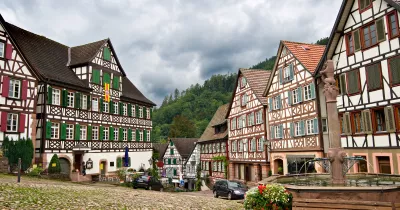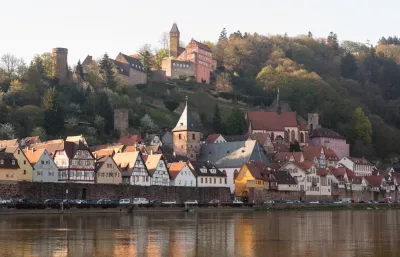The page is structured along the key elements outlined in the Policy Briefing ‘Making the Rural Pact happen in Member States’.
The examples and information provided below aim to inspire other EU Member States to take action, highlighting some of the relevant efforts made in the country by June 2025.
The information has been gathered by the Rural Pact Support Office national experts. It will be regularly updated with new information provided to the Rural Pact Support Office.
If you wish to share with us additional relevant initiatives, please contact us at communications[AT]rural-pact.eu.
-
91%
of Germany's territory is covered by rural areas -
83.5m
Over 83.5m people live in Germany -
57%
of German population live in rural areas
Source: Federal Ministry of Food and Agriculture (BMEL), “Ländliche Regionen”, using national definitions of rural areas combining predominantly rural and intermediate areas; EU Rural Observatory, Germany country profile and territorial indicators.
Designated government member and dedicated services for rural issues across policies
-
The Federal Ministry of Agriculture, Food and Regional Identity (BMLEH) is responsible for steering national rural development policy. The Ministry supports the strengthening of rural regions as independent, liveable and future-proof territories, tailored to their specific development potential.
-
The Federal Ministry of Agriculture, Food and Regional Identity is supported by the Expert Council on Rural Development(de. Sachverständigenrat für Ländliche Entwicklung – SRLE). The Council is composed of twelve independent experts from academia, local government and civil society.
Appointed by the Ministry, the Council provides strategic advice on rural policies across multiple areas, including demographics, services, employment, land use and the environment. Its opinions and reports contribute to shaping policy responses to emerging challenges, such as social cohesion, regional inequalities and the energy transition.
Forward-looking vision implemented through a holistic strategy/action plan
-
The Federal Government’s fourth Rural Development Report, issued in 2024, provides a comprehensive overview of the situation in rural areas and outlines coordinated federal policy responses. It highlights key priorities including demographic change, climate protection, public services, and social cohesion.
The report also tracks inter-ministerial action and reflects the government’s commitment to fostering equitable living conditions in urban and rural areas through targeted measures and programmes.
-
The Equality Report of the Federal Government monitors regional differences on the basis of 38 indicators covering economic performance, services, infrastructure, and environmental quality. It calls for ‘upward convergence’, in the aim of improving conditions in lagging regions without reducing standards elsewhere. Policy responses include stronger data monitoring, decentralisation of federal jobs, and greater transparency.
Appropriate governance systems to facilitate coordination
-
The Federal State Working Group on Sustainable Rural Development (de. ArgeLandentwicklung) is a permanent coordination body under the Conference of Agriculture Ministers (AMK), bringing together federal and federal state (de. Länder) administrations. It promotes a coordinated development of rural policy instruments and facilitates cooperation across levels of government. The group also engages with researchers and practitioners to support integrated and evidence-based rural development.
-
Coordination across federal ministries is supported by two working groups:
- The Working Group of Parliamentary State Secretaries (de. PSt-Arbeitsstab) brings together deputy ministers for political dialogue on rural development priorities.
- The Working Group ‘Rural Areas’ of Inter-Ministerial Directors (de. Interministeriellen Arbeitsgruppe ‘Ländliche Räume’, IMAG) ensures administrative-level collaboration and contributes to the preparation of the government’s Rural Development Report. These structures promote horizontal alignment across sectoral policies.
The Expert Council on Rural Development(SRLE) provides strategic input.
Mechanisms to coordinate the allocation of funding and ensure synergies
-
The Joint Task for the Improvement of Agricultural Structures and Coastal Protection (GAK) is Germany’s key national funding instrument for rural areas. It is co-financed by the federal and federal state (de. Länder) governments and supports projects in agriculture, forestry, infrastructure, environment and rural services.
A four-year framework plan is adopted by the Programme Committee (PLANAK), which brings together federal and federal state (de. Länder) agriculture ministers and the Federal Ministry of Finance. The GAK contributes to ensuring equitable living conditions by supporting long-term rural vitality.
Regional example: Brandenburg
-
In Brandenburg, a Joint Monitoring Committee (de. Gemeinsamer Begleitausschuss – GBA) provides a partnership-based coordination platform for the implementation of the European Regional Development Fund (ERDF); European Social Fund Plus (ESF+); Just Transition Fund (JTF); European Agricultural Fund for Rural Development (EAFRD); and European Agricultural Guarantee Fund (EAGF).
The Committee brings together representatives from administration and civil society, meets at least twice a year, and monitors progress towards shared development goals. It is chaired by the EU Funds Coordination Office within the Ministry of Finance and Europe (MdFE), in accordance with jointly agreed rules of procedure. The Contact and Advice Centre (KBS) supports the work of the Committee and fosters networking among its members.
Effective rural proofing and adequate data systems
-
The Equivalence Check (de. Gleichwertigkeitsprüfung) is Germany’s territorial proofing tool designed to assess whether proposed laws and policies support the constitutional goal of ensuring equivalent living conditions (gleichwertige Lebensverhältnisse) across all regions. Official guidelines for the tool have been approved by the federal cabinet and are expected to be taken into account during the policy preparation process, although their application is not mandatory.
-
The Thünen Institute – the Federal Research Institute for Rural Areas, Forestry and Fisheries – is a departmental research agency under the Federal Ministry of Agriculture, Food and Regional Identity, which provides scientific support for rural development policymaking. It conducts long-term evaluations, impact studies, and policy assessments related to agriculture, forestry, environment, and regional development.
The Institute plays a central role in developing rural monitoring tools, supplying indicators, and supporting spatially sensitive decision-making at federal level.
-
The Landatlas is a spatial monitoring tool for rural areas in Germany. Developed by the Thünen Institute, it combines official statistics with indicators from the Continuous Spatial Monitoring System and the INKAR database of the Federal Institute for Research on Building, Urban Affairs and Spatial Development (BBSR).
The tool includes accessibility indicators for basic services and is structured around nine thematic areas: spatial structure; population; social affairs; housing; utilities; accessibility; economy and labour; public finance; and land use. Data are provided at a municipal level to support differentiated territorial analysis and are updated annually.
-
The Deutschlandatlas is an interactive tool developed by four federal ministries to map regional living conditions across Germany. It visualises 82 indicators across key policy areas including education, healthcare, infrastructure, digitalisation, and mobility. The tool enables transparency, facilitates public engagement, and contributes to the strategic monitoring of spatial disparities.
Structures and mechanisms to engage with rural communities
-
The German National Rural Network is coordinated by the common agricultural policy (CAP) Network Unit (DVS), part of the Federal Office for Agriculture and Food (BLE). It supports the implementation of the CAP Strategic Plan 2023–2027 by facilitating cooperation, knowledge exchange, and capacity building among stakeholders in rural development.
The network connects Local Action Groups, managing authorities, NGOs, administrations, and research institutions, and promotes the exchange of good practices on LEADER, environmental and climate measures, and innovation.
-
The Agrarian Social Society (de. Agrarsoziale Gesellschaft, ASG) is a nationwide civil society organisation committed to strengthening the quality of life and working conditions in rural areas. It promotes dialogue on the transformation and future development of rural regions by initiating open debate, disseminating scientific knowledge and good practices, and facilitating networking among rural stakeholders.
The organisation works across professional and voluntary sectors and is involves by the Federal Ministry of Food and Agriculture, several regional governments, and a wide range of institutions and individuals active in rural development.
-
The Future Forum on Rural Development (de. Ländliche Entwicklung) is Germany’s largest annual platform for dialogue on rural policy, organised by the Federal Ministry of Food and Agriculture (BMEL).
The 18th edition in 2025 brought together over 1 000 stakeholders from government, civil society, academia, and practice to discuss key challenges and opportunities for rural areas. The event features high-level panels, workshops, and networking sessions on topics such as climate adaptation, digitalisation, community engagement, and integrated governance.
-
The Federal Ministry of Agriculture, Food and Regional Identity, together with states and associations, coordinate the nationwide competition ‘Our Village Has a Future’ (de. Unser Dorf hat Zukunft) to promote civic engagement and community development in rural areas.
Launched in 1961, the competition recognises villages that show strong social cohesion, innovative local projects, environmental awareness and sustainable development strategies. Held every three years, the process includes village evaluations at district, state, and national levels, with experts assessing initiatives through on-site visits and interviews. Winners receive financial prizes and national recognition.
Regional example: Brandenburg
-
The Village Movement Brandenburg is a grassroots initiative that brings together local village networks to promote citizen participation in rural development. It organises a biennial Rural Parliament under the patronage of the Brandenburg State Parliament and represents Germany in the European Rural Parliament.
The movement collaborates with national organisations such as the Agrarsoziale Gesellschaft (ASG), the Federal Association of Local Action Groups in Germany (de. Bundesarbeitsgemeinschaft der LEADER-Aktionsgruppen – BAG LAG), and the German CAP Network Unit (de. Deutsche Vernetzungsstelle Ländliche Räume – DVS).
Capacity building and networking support for a broad array of actors and stakeholders
-
The Federal Association of Local Action Groups (BAG LAG) brings together the majority of LEADER Local Action Groups in Germany. It provides a national platform for exchange, training, and strategic dialogue among LAGs and with public authorities.
BAG LAG supports capacity building through thematic working groups, publications, events, and coordination with European networks such as the European LEADER Association for Rural Development (ELARD). It also represents the interests of German LAGs at national and EU levels.
-
The Andreas Hermes Academy (de. Andreas-Hermes-Akademie) offers education, training, organisational development and change management for rural stakeholders. Its programmes target individuals and organisations in the agricultural and food sectors and wider rural economy. Founding members include the German Farmers’ Union (DBV), the Agricultural Savings Bank (de. Landwirtschaftliche Rentenbank), and the Federation of Agricultural Chambers (VLK).
Regional example: Schleswig-Holstein
-
The Academy for Rural Areas of Schleswig-Holstein (ALR) is a regional non-profit organisation supporting rural municipalities in the region. It offers practical solutions and capacity building in areas such as mobility, broadband, housing, and digitalisation. The Academy also initiates and supports applied research projects to strengthen rural innovation and planning.



